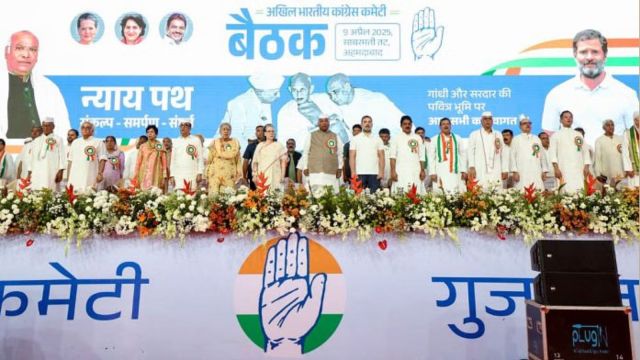
The 86th session of the All India Congress Committee (AICC) at Ahmedabad, where a “Nyay Path” resolution was passed, is significant for many reasons. Congress’s drubbing in the Haryana, Maharashtra and Delhi elections demoralised the party’s rank and file. Their upbeat mood after the 2024 parliamentary elections soon turned despondent, with chances of a comeback in 2029, once again, looking bleak.
A close reading of the “Nyay Path” resolution shows the party has realised that the euphoria created by the doubling of its seats in Parliament was misplaced. It was not a reflection of its revival. It continues to be in a state of decline, with its organisational structure in shambles, particularly in the populous states of the North and the East.
The AICC session offered the opportune moment for Congress to reset its agenda for 2029 as there is not much at stake in the next few state elections, barring Gujarat. But has the party diagnosed its ailments correctly? Or is it going to be another example of high-on-symbolism and low-in-action?
A few issues in the resolution deserve attention. The foremost among them is the plank of nationalism. Despite the martyrdom of its two towering leaders — Indira Gandhi and Rajiv Gandhi — for the cause of national unity and its history in the national movement, the party has singularly failed to retain this potent political card. Adding economic and social discontent to the politics of nationalism by highlighting the BJP’s divisiveness, which the resolution seeks to do, is worthy of trial. But reaching out to the people would require robust party organisation and energised party cadres.
The new resolve to devolve power to the district presidents may prove to be a double-edged sword, due to weak foundations of the party at many levels, along with the lack of inner-party democracy. The cure for the organisational ailments does not either lie in giving unbridled power to regional satraps as in Haryana or making the unelected district leaders representative of the High Command. The party needs to create inner-party democracy in true spirit by throwing all positions open to election from top to bottom without any exception.
The semantic mutation on secularism by switching to “national harmony” is suggestive of the growing realisation that a serious course correction is needed. The Sangh Parivar, through its diatribe against pseudo-secularism over the years, has put Congress on the defensive. Today, it seems to have lost its appeal among both the majority and the minorities, the former on account of a feeling of minority appeasement and the latter for its hollowness to meet their socio-economic aspirations.
Wooing them would require imaginative politics and evocative language. National harmony may not be the right substitute. The most challenging task, however, would be to win over the OBC votes poached by its allies in states like UP and Bihar. In the southern states, Congress has been able to maintain some standing among OBC communities. The reaction to Rahul Gandhi’s emphasis on reaching out to OBCs – a crucial vote bank for the INDIA bloc – would be keenly observed.
Overall, the resolution adopted at Ahmedabad sends out a clear signal that Congress is bracing for revival.
The writer is professor, political science, Aryabhatta college, Delhi University